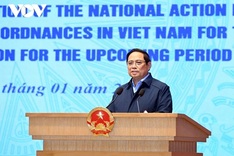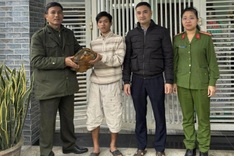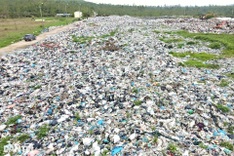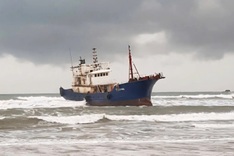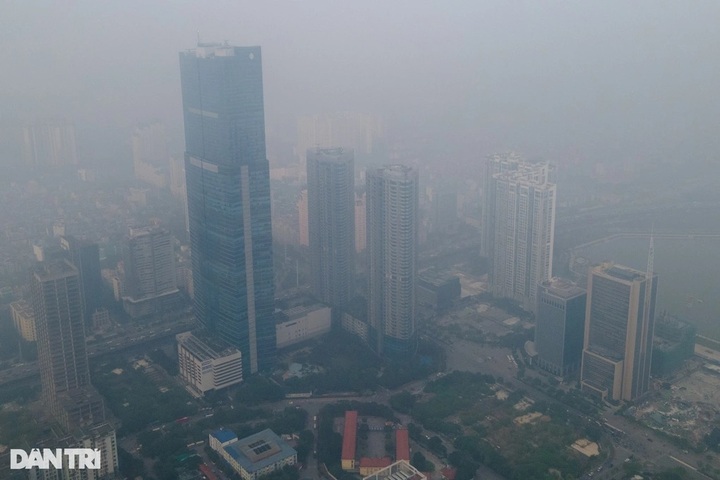
Weather exacerbates Hanoi's severe air pollution, worsening AQI levels
Hanoi ranked as the most polluted city in the world
Hanoi and the northern provinces are facing severe air pollution, which is expected to improve slightly but will persist in the coming days, prompting the Ministry of Health to issue a warning about its impact on human health.
Recently, the IQAir air quality index app ranked Hanoi as the most polluted city in the world, with air quality index (AQI) values reaching dangerous levels. On January 7, the AQI was 272, marked as purple, and on January 8, it was 219, also in the purple zone, which is highly detrimental to human health. For several days, West Lake in Hanoi has remained the most polluted area. These are all pollution levels in the brown zone, which pose risks to human health.
From January 10 to 12, due to the influence of a northeastern monsoon, air quality will improve to the yellow zone (moderate). However, by the beginning of next week, air pollution may return to the northern region.
According to the Ministry of Natural Resources and Environment's air quality report, air pollution in Hanoi has been increasing, with AQI values reaching poor levels at times. Pollution follows a seasonal pattern, influenced by climate and weather conditions.
The Environmental Pollution Control Department reports that in the northern region, PM2.5 dust levels typically rise from October to March, leading to severe air pollution. Air pollution tends to worsen before and after cold fronts, with a significant spike in the evening and early morning hours. By the end of October 2024, Hanoi had recorded a total of four severe air pollution episodes, three of which occurred between January and April, and one at the beginning of October.
Dr. Hoang Duong Tung, a member of the Vietnam Nature and Environment Protection Association, said that Hanoi and northern provinces are in the "worst air pollution season" of the year, typically lasting from October to March. Air pollution has been a severe issue for Hanoi for many years due to factors like traffic, industry, construction, and daily activities.
Explaining the air pollution situation in Hanoi, Dr. Tung stated that Hanoi has not yet controlled the sources of pollution. The air quality in Hanoi is consistently at red or purple alarm levels, but the more concerning issue is the increasing trend of pollution, which shows no signs of decreasing. This will lead to serious health consequences for the population, especially vulnerable groups such as the elderly and children.
Health risks from air pollution
The World Health Organization (WHO) reports that exposure to air pollutants increases the risk of respiratory diseases such as acute respiratory infections, chronic obstructive pulmonary disease, asthma, cardiovascular diseases, and stroke. It can also cause skin damage, eye diseases, neurological and immune system impacts, and affect mental health.
According to health recommendations, air pollution impacts the respiratory system: Fine particles (PM2.5) can penetrate deep into the lungs, causing long-term harm to lung cells and inflammation. It affects the cardiovascular system: Harmful chemicals and fine dust in polluted air not only affect the lungs but also have serious consequences for the cardiovascular system.
To proactively protect public health from the harmful effects of air pollution, the Ministry of Health’s Environmental Management Department has given recommendations for preventing and mitigating the health impacts of air pollution. These guidelines help citizens, particularly those sensitive to pollutants such as children, pregnant women, people with respiratory and cardiovascular diseases, and the elderly, to implement basic preventive measures and protect their health. The recommendations are based on the AQI air quality index.
When the AQI is in the poor range, it can already affect health, especially for sensitive groups. People should reduce or limit outdoor activities to avoid exposure to pollutants.
For a green capital
According to Dr. Hoang Duong Tung, Hanoi must carry out short-term, medium-term, and long-term solutions for each source of pollution. For example, for recycling craft villages, once pollution sources are identified, measures must be taken to reduce emissions.
For transportation, many policies such as creating low-emission zones, prioritizing public transport, and transitioning from gasoline vehicles to electric vehicles have been proposed. For waste, there needs to be a more professional waste management system that both reduces emissions and promotes green economic development.
Moreover, to reduce environmental pollution, citizens must collaborate by limiting pollution-causing behaviors like burning straw, waste, and paper money, while supporting government policies on emission reduction."
The Hanoi People's Committee has worked out a plan to launch the "Bright - Green - Clean - Beautiful" movement, with strong determination and a commitment to make a breakthrough in environmental protection work. The plan aims to strictly control pollution sources, promote collective action, and contribute to building a sustainable capital.
In recent days, many areas in Hanoi have implemented the movement with innovative models, with the participation of the political system and all citizens.
Dr. Le Danh Quang, Vice Rector of Hanoi University of High Technology, stated that we should promote the development of green, clean, and sustainable transportation. This includes controlling old vehicles, reducing emissions into the environment, and shifting from gasoline-powered to electric vehicles and green fuels.



